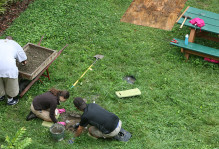thesis |ˈθēsis|, noun ( pl. -ses |-sēz|)
1 a statement or theory that is put forward as a premise to be maintained or proved : his central thesis is that psychological life is not part of the material world.
• (in Hegelian philosophy) a proposition forming the first stage in the process of dialectical reasoning. Compare with antithesis , synthesis .
2 a long essay or dissertation involving personal research, written by a candidate for a college degree : a doctoral thesis.
The word thesis came from late Middle English through late Latin from Greek – literally ‘placing, a proposition,’ from the root of tithenai ‘to place.’
Sorry I’m not sorry for telling you all of this – I’m a linguistics major.
Well, these next few weeks have been christened the Age of the Thesis for me, and I will be doing quite a bit of information ‘placing’ on my other William and Mary blog that I maintain for Charles Center, filled with my research from this summer until now. You will be able to follow my full thesis progress there as I have moved from musings, to thoughts, to outlines, to drafts, to, eventually, my final Honors Thesis in linguistics.
I hope to finish the entire draft of my thesis in the next week and a half. That’s right, all 35,000 words of it. I’m actually having fun doing it, too.
Follow along: http://ccsummerresearch.blogs.wm.edu/tag/brian-focarino/
Voltaire once said language is very difficult to put into words.
Clearly he wasn’t a linguistics student at William and Mary.




No comments.
Comments are currently closed. Comments are closed on all posts older than one year, and for those in our archive.